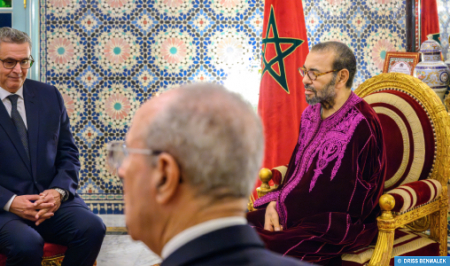
King Mohammed VI chaired, Monday at the Royal Palace in Casablanca, a working session devoted to the revision of the Family Code, during which he insisted that the new family code needs to ensure justice, equality, and harmony with Islamic precepts and universal values
King Mohammed VI made clear directives for the revision of Morocco’s Family Code, underlining the need for a balanced and holistic reform that aligns with the country’s religious precepts and contemporary social needs.
This session was held after the Entity in Charge of Revising the Family Code submitted to the King its report, which includes over 100 proposed amendments, and after the Supreme Council of Ulema provided a legal opinion on some specific proposals concerning religious texts, as requested by the Monarch, Commander of the Faithful, the Royal Office said in a statement.
The session also comes after the King made the necessary arbitrations on issues on which the entity issued more than one opinion, or where revisions required recourse to Sharia. These Royal arbitrations have given priority to choices that are in line with the guidelines and objectives outlined in the Royal Letter addressed to the Head of Government, as well as those set by the norms governing the Body’s work, mainly the norm of “not prohibiting what is authorized, nor authorizing what is prohibited.”
During the session, the King stressed the need to keep in mind his desire for reform and openness to progress, through the launch of this promising reform initiative, twenty years after the implementation of the Family Code in 2004, and to guarantee the protection of the family on legal, social and economic aspects.
The Sovereign also stressed the need to perceive the content of the reform within a framework of complementarity, in the sense that it does not favor one party to the detriment of the other, but concerns the Moroccan family, which constitutes the “basic cell of society.” This implies ensuring that all the above is drawn up in the form of clear and intelligible legal rules, in order to avoid contradictory judicial readings and cases of conflict in their interpretation.
Likewise, the Monarch urged that the legislative process, including parliamentary debates, should be permeated by the principles of “justice, equality, solidarity, and harmony,” in line with Islamic precepts and the universal values in keeping with the international agreements ratified by Morocco, said the royal office statement.
The King also drew attention to the mandatory need to give the necessary attention to all the prerequisites supporting and strengthening the Family Code revision. This includes consolidating the experience of family justice, and revising the relevant legislative and regulatory texts in light of the new constitutional provisions.
In this regard, the King instructed the cabinet members in charge of the reform to communicate with citizens and explain to them the new reform in addition to raising the public’s awareness to their rights under the new code.
During this session, Minister of Justice Abdellatif Ouahbi, as a member of the Entity in Charge of Revising the Family Code, made a presentation on the Entity’s participatory approach and working methodology, in particular the hearing sessions organized, as well as the most important proposals made during these hearings that are included in the report submitted to the King.
The Minister of Endowments and Islamic Affairs Ahmed Toufiq, as a member of the Supreme Council of Ulema, presented the conclusions of the Council’s Opinion, which established the essential legal basis for some of the Entity’s proposals, and took into account the principle of Maslaha (interest) to find Sharia-compliant solutions regarding other proposals. This provided an opportunity to highlight the capacity of constructive Ijtihad in deducing Sharia rules, the middle ground and moderation of the Moroccan School of Fiqh, which draws its foundations from the Kingdom’s religious constants.
In this connection, the King called on the Supreme Council of Ulema to pursue reflection and adopt constructive Ijtihad on the issue of the family, by creating an adequate framework within its structure, in order to deepen research into Fiqh issues linked to the evolutions experienced by the Moroccan family, and which require innovative responses in phase with the demands of the present day.
